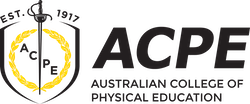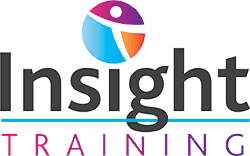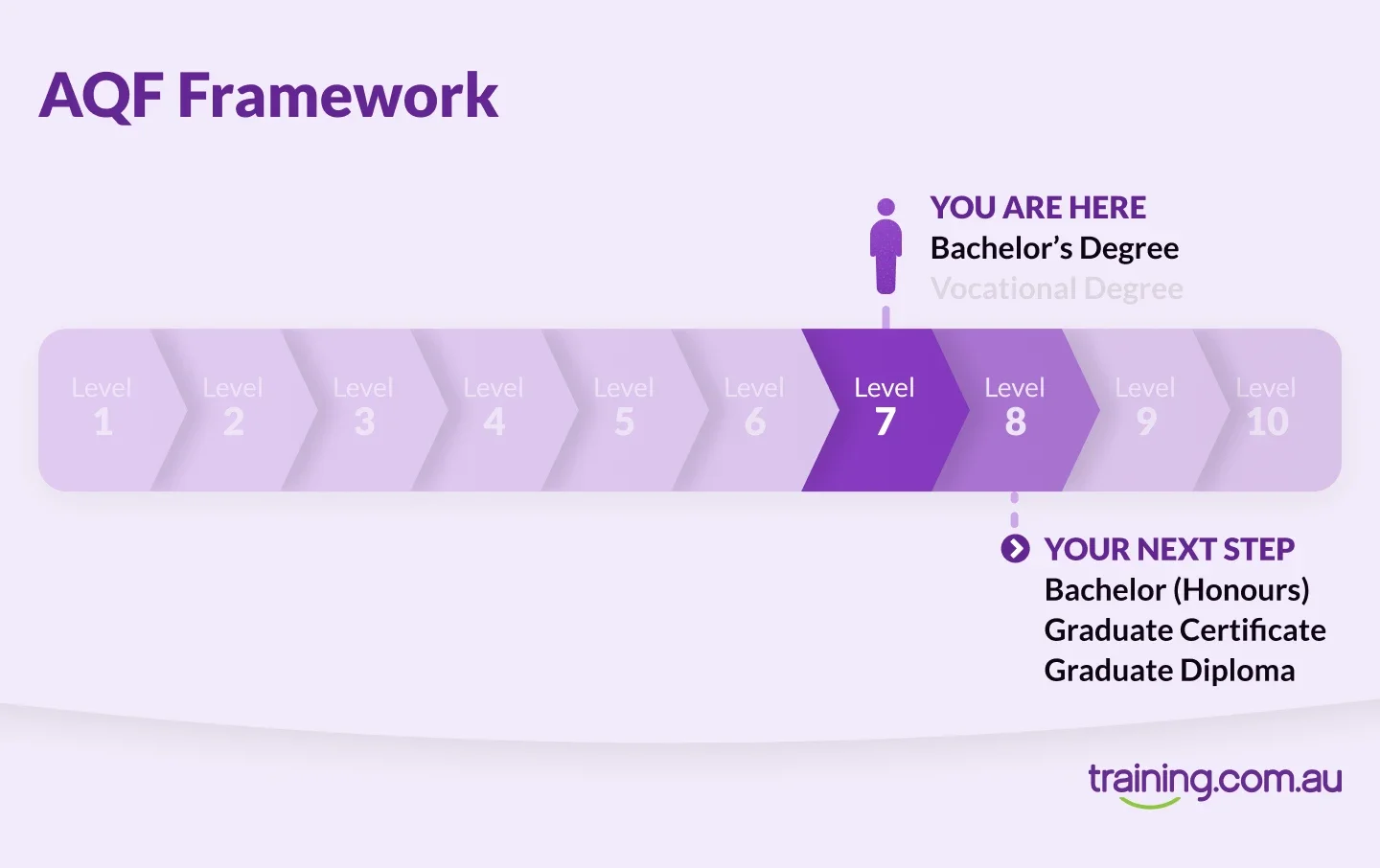What is a Bachelor's Degree in Australia?

If you’re looking for a qualification that opens doors to professional careers, postgraduate study, and lifelong learning, a bachelor’s degree is a powerful step forward.
A bachelor’s degree is typically considered the first degree in higher education and serves as the foundation for further academic or professional pursuits. This versatile qualification arms you with the knowledge and skills you need to thrive in a wide range of industries, from healthcare and engineering to education, business, and the arts.
No matter if you’re a school leaver, a career changer, or someone returning to study, a bachelor’s degree can help you reach your career goals and achieve long-term academic success.
Ready to learn more? Discover what a bachelor’s degree is, what the benefits are, and whether it’s worth it for your career.
What is a bachelor’s degree?
A bachelor’s degree is an undergraduate qualification at Level 7 on the Australian Qualifications Framework (AQF). Within the AQF, a bachelor’s degree is considered a major level of academic qualification, distinguishing it from other undergraduate degrees such as associate degrees or diplomas.
Undergraduate degrees include bachelor’s, associate’s, and diploma programs, with the bachelor’s typically being the most comprehensive. It provides an in-depth education in a specific discipline, blending theoretical learning, practical training, and opportunities for industry placements.
You’ll gain a strong academic foundation alongside real-world application, ensuring you’re ready for graduate-level employment or further study in postgraduate programs like a master’s degree. Depending on your pathway, you may also consider a double degree, combining two fields of study over a four-to five-year period.
Bachelor’s degree entry requirements
To enrol in a bachelor’s degree in Australia, you’ll typically need:
- Completion of secondary school (Year 12) or equivalent
- A minimum ATAR or selection rank
- Prerequisite subjects for some courses (e.g. mathematics for engineering)
- English language proficiency, where applicable
- Supporting documents (e.g. academic transcripts or personal statements)
Recent secondary education and life experience are both considered in admissions. Many universities also provide entry support for mature-aged students or those with vocational education backgrounds.
How long does a bachelor’s degree take?
Most bachelor’s degrees take 3 to 4 years of full-time study to complete. Some degrees, such as engineering or double degrees, may take longer. In double degree programs, students usually complete the same number of courses per semester as those in single degree programs, which can affect the overall study timeline.
If you’re balancing work or personal commitments, part-time and online study options are widely available to help you maintain flexibility throughout your study journey.
How much does it cost?
The cost of a bachelor’s degree varies depending on your course and university, but domestic students can usually access:
- Commonwealth Supported Places (CSPs): Subsidised tuition fees.
- HECS-HELP: A government loan scheme that allows you to defer payment until your income meets a certain threshold.
This makes a university education more accessible and allows you to focus on your learning outcomes without upfront financial pressure.
Who should enrol?
A bachelor’s degree is ideal for students who:
- Want a qualification for professional careers
- Need a pathway to postgraduate study
- Are motivated by academic success and long-term growth
- Prefer structured learning with real-world applications
- Have completed recent secondary education and want to continue directly into higher education
Benefits of studying a bachelor’s degree
1. Strong employment outcomes
- In 2023, 79% of bachelor graduates secured full‑time work within 6 months.
- Entry-level median salaries sit around $71,000, with postgraduate coursework graduates earning up to $96,600
2. Defined career pathways
- Required for regulated professions like teaching, law, engineering, healthcare, and the sciences
- Open doors to leadership roles, postgraduate study, and academic development (e.g., honours, master’s).
3. Rich learning experiences
- Offers both theoretical knowledge and practical skills, supported by internships and research projects.
- Access comprehensive student services, networking, and a campus community.
Potential challenges
1. Financial burden
- Degrees cost more and take longer than vocational alternatives.
- Students incur debt through HECS‑HELP, which must eventually be paid.
2. Job market saturation
- Some graduates experience underemployment or delay finding full-time roles.
- Wage and employment premiums vary depending on degree and field.
3. Credential inflation
- As more people hold degrees, novices may see less advantage unless their degree is specialised or professionally recognised
What can you study?
Bachelor’s degrees are available across nearly every industry, but some stand out for their strong career outcomes and broad appeal. Popular choices include:
Bachelor of Business or Commerce
Ideal for careers in management, marketing, finance, and entrepreneurship, with practical skills for diverse industries.
Bachelor of Health Sciences or Nursing
Prepares students for in-demand healthcare roles, including patient care, allied health, and medical research
Bachelor of Engineering or IT
Offers technical training in software development, systems engineering, and computer science, driving innovation and problem-solving.
Bachelor of Education
Equips future teachers with the theory and classroom experience needed to thrive in primary, secondary, or special education.
Bachelor of Arts or Creative Writing
Builds critical thinking, communication, and creativity—ideal for careers in media, writing, and public relations.
These qualifications offer flexible career options, industry relevance, and strong learning outcomes tailored to your professional goals.
What’s the difference? (Bachelor vs diploma)
Feature |
Bachelor Degree |
Diploma |
|---|---|---|
AQF Level |
Level 7 |
Level 5 |
Duration |
Academic depth, theory, and research |
Advanced vocational |
Focus |
Academic depth, theory, and research |
Advanced vocational |
Pathways |
Postgraduate study, professional careers |
Practical knowledge, industry-ready skills |
Common Fields |
Law, engineering, science, arts, teaching |
Fast-tracking employment, vocational qualification |
International student considerations
For international students, embarking on an undergraduate degree in Australia is an opportunity to gain a competitive edge in the global workforce and boost your graduate employability.
Australian universities offer a diverse range of undergraduate programs, including bachelor’s degrees, associate degrees, and double degree options, allowing you to tailor your university education to your interests and career goals.
Many institutions place a strong emphasis on practical experience, internships, and research projects. This hands-on approach ensures that international students graduate with the knowledge and skills needed for their chosen career, whether in engineering, computer science, the arts, or the sciences.
You’ll also find a variety of undergraduate courses and majors, so you can explore specific subjects and discover new interests throughout your undergraduate studies.
Upon graduation, international students can pursue a wide range of career options or continue their education with postgraduate study, such as a master’s degree.
So, is a bachelor's degree worth it?
A bachelor’s degree remains one of the most valuable long-term investments you can make in your future, especially if you’re pursuing a specialised or professional career. It’s often the minimum qualification for roles in sectors like healthcare, education, law, engineering, and business, where industry accreditation, licensing, and leadership opportunities depend on formal university qualifications.
With median graduate salaries starting at $71,000 and a 79% full-time employment rate within six months, the financial return is strong, particularly over the course of a lifetime.
Bachelor’s degrees also unlock access to postgraduate study, research roles, and advanced career pathways that may not be available through vocational training alone. They allow you to specialise, build a well-rounded knowledge base, and grow the critical thinking and problem-solving skills that are essential for high-level roles.
That said, if your goals are more hands-on or immediate, like entering a trade, getting qualified quickly, or building practical experience, a Diploma or VET qualification may be a faster, more cost-effective, and equally rewarding option.
The best pathway depends on your personal goals, industry of interest, and how you prefer to learn.
Final take
A bachelor’s degree can pay dividends in employment, income, and personal growth, but it requires commitment and financial planning. Evaluate it based on:
- Your career objectives
- Field-specific job outlook and earning trends
- Your financial and time investment tolerance
If you want expert signalling, broader career options, and a strong knowledge and skills foundation, a bachelor’s degree remains a powerful tool.
Browse bachelor’s degrees and invest in your learning journey today!
Browse Results
Diploma of Nursing
Build a meaningful career that makes a difference with the HLT54121 Diploma of Nursing. This nationally recognised qualification provides the essential skills, knowledge, and practical training needed to become a qualified Enrolled Nurse in Australia....


Graduate Diploma in Management
The Graduate Diploma in Management is an online postgraduate qualification that is ideal for busy senior managers, with a potential entry pathway through any of our Graduate Certificates and study that is highly supported, fits into your schedule, and...

Graduate Certificate in Management
The Graduate Certificate in Management is an online postgraduate qualification that is designed for newer and ambitious professionals, with entry possible through management experience alone and a study structure that easily accommodates full-time work...

Associate Degree of Sport Business (NSW Only)
Get a higher education qualification in two years when studying full-time! Based on the Bachelor of Sport Business in terms of content, the Associate Degree of Sport Business offers students the opportunity to get into the workforce quicker or alternat...

Bachelor of Dance Education (NSW Only)
The Bachelor of Dance Education is a unique specialist professional qualification and is Australia’s first–being delivered through ACPE! Units are provided by highly qualified and experienced professionals, empowering you with all the knowledge and ski...

Bachelor of Dance Practice (NSW Only)
The Bachelor of Dance Practice is a specialised degree that will equip you with the skills and experience to become a professional in the dance industry. The course develops artistry, choreography, performance, educational, business, and organisational...

Bachelor of Education (Physical & Health Education) (NSW Only)
The Bachelor of Education (Physical & Health Education) incorporates units in movement and health as well as curriculum and pedagogical studies, equipping you with the requisite skills for entering the teaching profession. If you are keen to pursue...

Bachelor of Health Science (Exercise) (NSW Only)
The Bachelor of Health Science (Exercise) offers the perfect career path for those looking to enhance their knowledge and skills through further studies in physiotherapy, exercise physiology, and other health professions. You will come to understand ho...

Bachelor of Sport Business (Leadership)
Turn your passion for sport into a career by immersing yourself in a degree that will broaden your theoretical and technical knowledge, so that you are fully equipped fora management role within the sport industry. The Bachelor of Sport Business (Leade...

Bachelor of Sports Coaching (Strength and Conditioning) (NSW Only)
To address the high demand for sport coaches and professionals in Australia, the Bachelor of Sport Coaching (Strength and Conditioning) is a specialist degree fostering the coaching, administrative, and professional skills necessary for a fulfilling ca...

Certificate III in Community Services (WA Only)
The Certificate III in Community Services is perfect for entry level community services workers who support individuals through the provision of person-centred services. Work may include day-to-day support of individuals in community settings or suppor...

Certificate IV in Fitness
Take the next step in your career and gain the qualification you need to become a Personal Trainer. If you currently work in the fitness industry as a Gym or Group Fitness Instructor, elevate yourself to the next level by studying the SIS40221 Certific...

Certificate III in Fitness
If you’re looking to begin your career in the fitness industry, studying the SIS30321 Certificate III in Fitness is the perfect qualification to get you started. Gain all the knowledge and skills you need to enter the industry as a Gym Instructor or Gr...

Personal Trainer Course
Join the fitness industry as a Personal Trainer and turn your love for fitness into a rewarding career by graduating in both the SIS30321 Certificate III in Fitness & SIS40221 Certificate IV in Fitness. Enjoy the flexibility of being your own boss...

Bachelor of Health Science (Clinical Nutrition)
Clinical nutritionists integrate traditional food wisdom and current scientific evidence to motivate individuals and communities to eat well and live healthier lives. The Bachelor of Health Science (Clinical Nutrition) is supported by a strong underpin...

Bachelor of Health Science (Naturopathy)
Naturopathy is a whole medical system combining theory (philosophy and principles) and practise that uses an array of natural therapies to support healing and maintain health. Naturopaths aim to treat the underlying causes of illness and disease. The c...

Certificate III in Community Services (Perth Only)
Are you a natural when it comes to providing guidance to people? Would you like to kick start a career in Community Services? The Certificate III in Community Services (CHC32015) is the perfect entry-level qualification for prospective Community Servic...

Certificate III in Individual Support (Ageing OR Disability) (Perth Only)
If you have a passion for helping those most in need, this qualification is one way you can utilise your knowledge for the benefit of others. Package the Certificate III in Individual Support (Ageing or Disability) (CHC33021) to save time and gain know...

Certificate lll in Early Childhood Education & Care (Perth Only)
If you love working with children and want to learn more about providing quality education and care in a range of environments, this course is for you. The Certificate lll in Early Childhood Education and Care (CHC30121) can provide you with an entry-l...

Certificate III in Individual Support (Disability) (SA Only)
The Certificate III in Individual Support (Disability) is designed to equip you with the practical skills and knowledge to support people living with disability in a variety of care settings. With a focus on person-centred support, you’ll learn how to...



